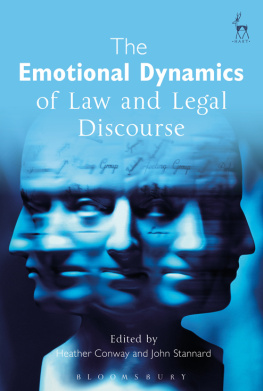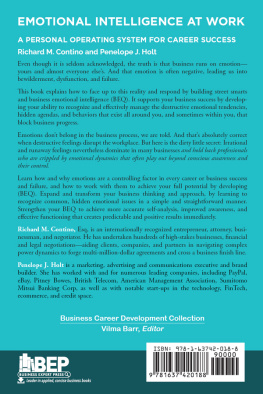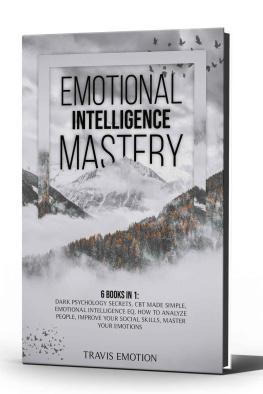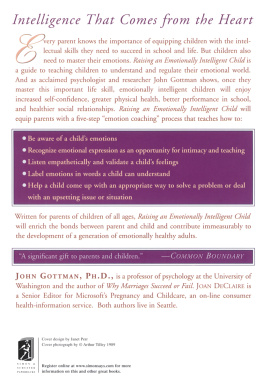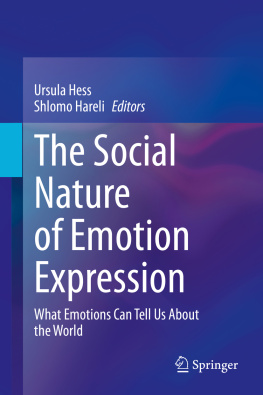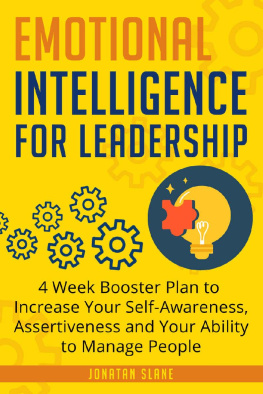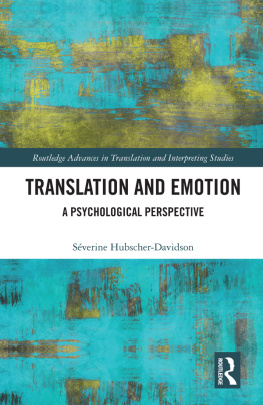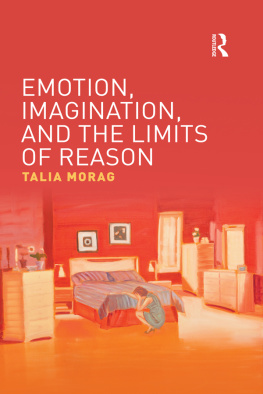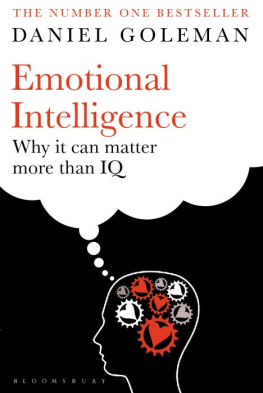Table of Contents

THE EMOTIONAL DYNAMICS OF LAW AND LEGAL DISCOURSE
In his seminal work, Emotional Intelligence, Daniel Goleman suggests that the common view of human intelligence is far too narrow and that emotions play a much greater role in thought, decision-making and individual success than is commonly acknowledged. The importance of emotion to human experience cannot be denied, yet the relationship between law and emotion is one that has largely been ignored until recent years. However, the last two decades have seen a rapidly expanding interest among scholars of all disciplines into the way in which law and the emotions interact, including the laws response to emotion and the extent to which emotions pervade the practice of the law. In The Emotional Dynamics of Law and Legal Discourse a group of leading scholars from both sides of the Atlantic explore these issues across key areas of private law, public law, criminal justice and dispute resolution, illustrating how emotion infuses all areas of legal thought. The collection argues for a more positive view of the role of emotion in the context of legal discourse and demonstrates ways in which the law could, in the words of Goleman, become more emotionally intelligent.
The Emotional Dynamics of
Law and Legal Discourse
Edited by
Heather Conway and John Stannard

OXFORD AND PORTLAND, OREGON
2016
In March 2013, the School of Law at Queens University Belfast hosted a two-day colloquium entitled The Emotional Dynamics of Law and Legal Discourse. One of the first specialist conferences on law and emotion to be held in the UK, participants were treated to a range of thought-provoking papers from legal academics, a high court judge, a clinical psychologist and a professor of psychology. Our thinking behind the colloquium was fairly straightforward: to bring together a diverse range of people working in the area of law and emotion, and to stimulate further research collaboration. The current edited collection is the first of what we hope will be many by-products of that gathering.
The authors owe a huge debt of gratitude to all those who were instrumental in bringing the collection to fruition. The School of Law at Queens University provided the funding for the initial colloquium, which ultimately allowed us to invite speakers from England, Scotland, Europe and the United States, and to bring them to Belfastin some instances for the first time. Thanks also to each of the contributors involved in the collection for producing such a diverse and insightful array of scholarship, and for putting up with our numerous emails when we were probably driving them to the proverbial point of distraction. Every paper in this collection has been subject to a triple peer-review process, with individual chapters reviewed by the co-editors, another contributor to the collection and by an anonymous referee. The editors are extremely grateful to all those individuals who gave their valuable time and expertise to this, and who enhanced the collection as a result.
On the publishing side, thanks to Richard Hart for encouraging the submission of this proposal, and to Hart Publishing for agreeing to publish the book and for their professionalism and endless patience along the way. In particular, we are grateful to Annie Mirza who advised us and reassured at all stages of the submission process, even when it was yet another request for more time! Thanks also to everyone involved in the production process, and especially to Tom Adams as Production Manager.
Heather Conway and John Stannard
School of Law, Queens University Belfast
March 2016
Though neither the colloquium organisers nor the School of Law can take credit for the heavy snowfall which greeted everyone on arrival, and prompted a very distinctive emotional response from Professor Kathy Abrams who travelled from the University of California at Berkeley and had never seen real snow before!
Editors
Dr Heather Conway is a Senior Lecturer in the School of Law at Queens University Belfast. She has written a number of articles on emotion in selected aspects of property law, and in the areas of property law and succession law more generally. Her main research interest is in the law governing the fate of the recently dead and associated decision-making responsibilities, with particular emphasis on the laws around the post-mortem treatment of bodies, corpse disposal and disputes within families over their dead (including funeral disputes, and family tensions around exhumation and commemoration). She has presented and published extensively in this area, and is the author of The Law and the Dead (Routledge, 2016).
Dr John Stannard is a Senior Lecturer in the School of Law at Queens University Belfast where he has worked since 1977. His interest in law and emotion dates back to a conference paper written in 1992, and since then he has published on the subject in a range of journals, including the Journal of Criminal Law, the Northern Ireland Legal Quarterly and the University of New South Wales Law Journal. He has also delivered papers at numerous conferences, including the Society of Legal Scholars, the Irish Association of Law Teachers, the Association for the Study of Law, Culture and the Humanities, the International Association for Law and Mental Health, and the Multisensory Law Colloquium. In 2009 he was a Visiting Scholar at the Center for Law and Society in Berkeley, California, and he is keen on encouraging contacts between different groups of scholars working in the field of law and emotion on both sides of the Atlantic.
Contributors
Professor Kathryn Abrams is Herma Hill Kay Distinguished Professor of Law at the University of California-Berkeley School of Law. She holds a JD from Yale Law School, and previously taught at Boston University and Cornell University. Her early scholarship on statutory civil rights led to a focus on social movements that aim to secure greater equality under law. Her work on feminist jurisprudence analysed the use of experiential story-telling to produce feminist legal change, and the resistance to the expression or evocation of emotion in legal discourse. These interests led to her work with Professor Hila Keren on the cultivation of emotion through law, Law in the Cultivation of Hope (California Law Review, 2007), and on the foundations and normative trajectory of law and emotions scholarship, Whos Afraid of Law and the Emotions? (Minnesota Law Review, 2009). More recently she has become interested in the role of emotion in rights claiming and social movement mobilisation, Emotions in the Mobilization of Rights (Harvard Civil RightsCivil Liberties Law Review, 2011). Her current research project is an empirical study of the immigrant justice movement in the State of Arizona.
Laurel Farrington is a mediator with Mediation Hertfordshire. She has had a long career in local government and the voluntary sector in social work and management and in a wide range of settings across every client group. Originally trained and experienced in workplace mediation, over the past six years, she has focused on mediation and conflict coaching with housing association tenants. She is currently a PhD student at the University of Strathclyde, researching the role of empathy in mediation, with particular regard to difficult clients.
Dr Jane Herlihy is a Chartered Clinical Psychologist based in London. She worked briefly at the Medical Foundation for the Care of Victims of Torture (now Freedom from Torture) and then at the Refugee Service of the Traumatic Stress Clinic, a centre for asylum seekers and refugees experiencing difficulties following traumatic experiences. She is now Executive Director of the Centre for the Study of Emotion and Law, writing and conducting research into decision-making in refugee status claims. She has presented widely to clinicians, lawyers and judges, both on the clinical treatment of asylum seekers and refugees following traumatic experiences, and on the psychological aspects of refugee status decision-making. She also has a clinical practice at the Trauma Clinic in London. Dr Herlihy is an associate member of the International Association for Refugee Law Judges (IARLJ) and an Honorary Lecturer at University College, London.

